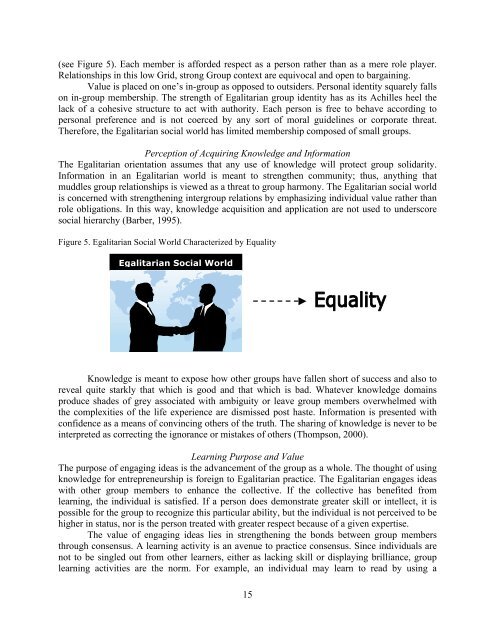Journal of Research in Innovative Teaching - National University
Journal of Research in Innovative Teaching - National University
Journal of Research in Innovative Teaching - National University
Create successful ePaper yourself
Turn your PDF publications into a flip-book with our unique Google optimized e-Paper software.
(see Figure 5). Each member is afforded respect as a person rather than as a mere role player.<br />
Relationships <strong>in</strong> this low Grid, strong Group context are equivocal and open to barga<strong>in</strong><strong>in</strong>g.<br />
Value is placed on one’s <strong>in</strong>-group as opposed to outsiders. Personal identity squarely falls<br />
on <strong>in</strong>-group membership. The strength <strong>of</strong> Egalitarian group identity has as its Achilles heel the<br />
lack <strong>of</strong> a cohesive structure to act with authority. Each person is free to behave accord<strong>in</strong>g to<br />
personal preference and is not coerced by any sort <strong>of</strong> moral guidel<strong>in</strong>es or corporate threat.<br />
Therefore, the Egalitarian social world has limited membership composed <strong>of</strong> small groups.<br />
Perception <strong>of</strong> Acquir<strong>in</strong>g Knowledge and Information<br />
The Egalitarian orientation assumes that any use <strong>of</strong> knowledge will protect group solidarity.<br />
Information <strong>in</strong> an Egalitarian world is meant to strengthen community; thus, anyth<strong>in</strong>g that<br />
muddles group relationships is viewed as a threat to group harmony. The Egalitarian social world<br />
is concerned with strengthen<strong>in</strong>g <strong>in</strong>tergroup relations by emphasiz<strong>in</strong>g <strong>in</strong>dividual value rather than<br />
role obligations. In this way, knowledge acquisition and application are not used to underscore<br />
social hierarchy (Barber, 1995).<br />
Figure 5. Egalitarian Social World Characterized by Equality<br />
Egalitarian Social World<br />
Knowledge is meant to expose how other groups have fallen short <strong>of</strong> success and also to<br />
reveal quite starkly that which is good and that which is bad. Whatever knowledge doma<strong>in</strong>s<br />
produce shades <strong>of</strong> grey associated with ambiguity or leave group members overwhelmed with<br />
the complexities <strong>of</strong> the life experience are dismissed post haste. Information is presented with<br />
confidence as a means <strong>of</strong> conv<strong>in</strong>c<strong>in</strong>g others <strong>of</strong> the truth. The shar<strong>in</strong>g <strong>of</strong> knowledge is never to be<br />
<strong>in</strong>terpreted as correct<strong>in</strong>g the ignorance or mistakes <strong>of</strong> others (Thompson, 2000).<br />
Learn<strong>in</strong>g Purpose and Value<br />
The purpose <strong>of</strong> engag<strong>in</strong>g ideas is the advancement <strong>of</strong> the group as a whole. The thought <strong>of</strong> us<strong>in</strong>g<br />
knowledge for entrepreneurship is foreign to Egalitarian practice. The Egalitarian engages ideas<br />
with other group members to enhance the collective. If the collective has benefited from<br />
learn<strong>in</strong>g, the <strong>in</strong>dividual is satisfied. If a person does demonstrate greater skill or <strong>in</strong>tellect, it is<br />
possible for the group to recognize this particular ability, but the <strong>in</strong>dividual is not perceived to be<br />
higher <strong>in</strong> status, nor is the person treated with greater respect because <strong>of</strong> a given expertise.<br />
The value <strong>of</strong> engag<strong>in</strong>g ideas lies <strong>in</strong> strengthen<strong>in</strong>g the bonds between group members<br />
through consensus. A learn<strong>in</strong>g activity is an avenue to practice consensus. S<strong>in</strong>ce <strong>in</strong>dividuals are<br />
not to be s<strong>in</strong>gled out from other learners, either as lack<strong>in</strong>g skill or display<strong>in</strong>g brilliance, group<br />
learn<strong>in</strong>g activities are the norm. For example, an <strong>in</strong>dividual may learn to read by us<strong>in</strong>g a<br />
15

















